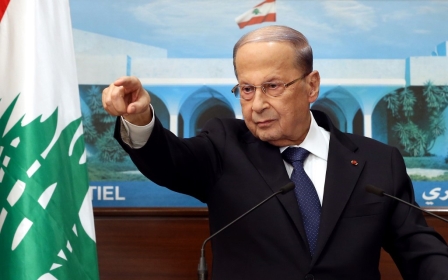US envoy pushes Lebanon-Israel talks over maritime dispute

United States envoy Amos Hochstein arrived in Beirut on Sunday to push talks to resolve a bitter maritime border dispute between Lebanon and Israel over Mediterranean waters with offshore gas fields.
"Reaching a resolution is both necessary and possible, but can only be done through negotiations and diplomacy," the US State Department said in a statement ahead of Hochstein's visit.
Washington's envoy for global infrastructure and investment is "facilitating negotiations between Lebanon and Israel on the maritime boundary," the statement added.
Hochstein met with Lebanon's Energy Minister Walid Fayad on Sunday and was scheduled to meet with President Michel Aoun and Prime Minister Najib Mikati the following day.
The maritime border dispute between Lebanon and Israel escalated in early June, after Israel moved a production vessel to the Karish offshore field, which is partly claimed by Lebanon.
The move prompted Beirut to call for the resumption of US-mediated negotiations on the demarcation dispute.
Lebanon and Israel have no diplomatic relations and are separated by a UN-patrolled border.
They had resumed maritime border negotiations in 2020, but the process was stalled by Beirut's claim that the map used by the United Nations in the talks needed modifying.
Lebanon initially demanded 860 sq km of territory in the disputed maritime area but then asked for an additional 1,430 sq km, including part of the Karish field.
Israel claims that the field lies in its waters and is not part of the disputed area subject to negotiations.
Hezbollah threats
A Lebanese official in mid-June said Beirut had made a new offer to Hochstein, holding back on demands for territory where Israel planned imminently to extract gas.
Beirut was pushing for the country's maritime border to exclude Karish and include the whole of a nearby field instead, the official said at the time.
An Israeli official on Sunday called Hochstein's latest visit a "moment of truth" and said Israel's offer, which related to the original disputed zones, was a "compromise to both sides".
"The offer we presented is one that would enable Lebanon to develop the reservoir that is in the disputed area," the official told AFP on condition of anonymity.
"The goal of the offer is to allow the Lebanese to develop it while safeguarding Israel's economic and other interests," the official added, referring to "the Sidon reservoir," known in Lebanon as the Qana field.
On 2 July, Israel said it had downed three drones launched by Lebanon's Iran-backed Hezbollah that were heading towards the Karish gas field.
The powerful Shia Muslim movement on Sunday released a short video it said showed surveillance of several Israeli-chartered energy infrastructure ships, including the production vessel sent to Karish that is operated by London-listed firm Energean.
Iran-backed Hezbollah's chief Hassan Nasrallah earlier this month warned that if Lebanon was prevented from extracting oil and gas from its waters, "nobody" would be able to do so, adding that Israeli offshore fields were "under threat" from the group's missiles.
Israel and Hezbollah last fought a devastating war in 2006.
Middle East Eye delivers independent and unrivalled coverage and analysis of the Middle East, North Africa and beyond. To learn more about republishing this content and the associated fees, please fill out this form. More about MEE can be found here.





